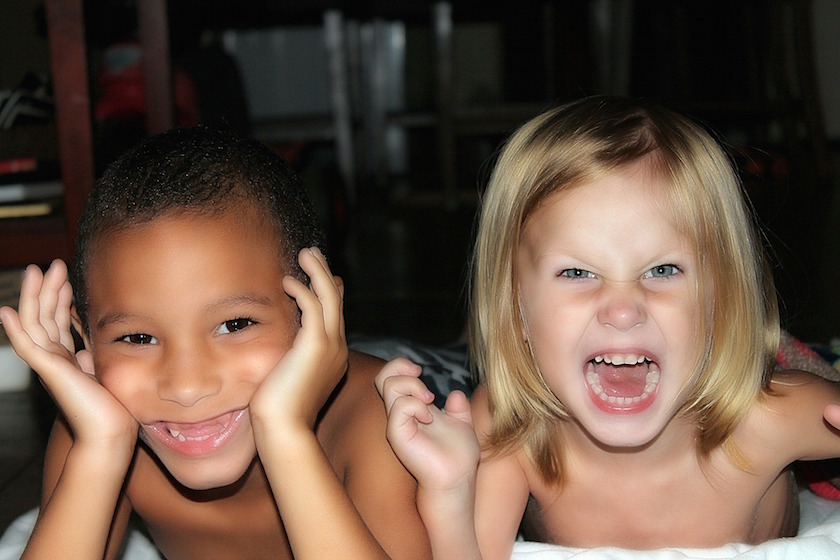
Is It Misbehavior, or Is My Kid Just Bad?
I’m not too big on reading blogs (Oh, the irony!). I get most of my learning from books or face-to-face experiences. But I recently happened upon a cool blog post that spoke to an idea I use with families all the time. It’s called Hanlon’s Razor, and while it may sound like an unpublished poem about an ambivalent, bearded man, it’s actually much less random and much more useful than that. From the Farnam Street blog: "Never attribute to malice that which can be adequately explained by neglect."
When I'm helping parents understand their kids' troubling behavior, I frame Hanlon's Razor as a choice between perceiving incompetence or malevolence. When young children misbehave it’s usually because they lack the ability to consistently behave as expected. Their revenge, manipulation, and ill will are typically not well developed and are counterbalanced by children's natural fears of losing their parent's love and breaking hallowed social rules. Doctor Ross Greene, author of The Explosive Child, puts it succinctly: Kids do well if they can.
Want More Help with Your Child?
Enroll Now in a Free Online Course on Parenting Tough Toddlers!
Bad Babies
Not to put too fine of a point on it, but little kids are pretty incompetent by adult standards. Their buttwiping is subpar, their rational thinking leaves a lot to be desired, and their social graces are often more reminiscent of a zoo animal than a human animal. Most adults get that kids’ brains aren’t fully developed and that these neurological immaturities lead to behavioral ones. But when it comes to heat-of-the-moment, you-better-do-what-I-say-or-else interactions with their young children, parents sometimes attribute negative intentions without clear cause. In other words, parents mistakenly think their child is bothering/defying them on purpose.
"[Young children's] revenge, manipulation, and ill will are usually not well developed and are counterbalanced by children's natural fears of losing their parent's love and breaking hallowed social rules."
You hear such interpretations in statements like:
- “Oh, he knows exactly what he’s doing.”
- “She always has to do things her way.”
- “The kids just know how to get under my skin.”
- “No matter what I do, he just refuses to listen to me.”
Parents who attribute their little one's behavior to bad intentions often have more difficulty responding effectively and maintaining a positive relationship.
Developmental Skills
One helpful way of approaching these challenging moments is to reframe them, or look at them from a different angle. Focusing on the child’s (lack of) emotional skills is one such angle and jives well with Hanlon’s Razor. Basically, when your child is acting the fool and you interpret it first as an ability problem, then that frees you up to think creatively about how to remedy the immediate situation and later gameplan for helping the child develop competence.
An example:
Sami is pouting, grunting, and kicking some toys in the hallway. This assertive 3-year-old is angry at his dad because he made the child’s favorite dish, pasta with marinara sauce, with elbow noodles instead of spaghetti, the slurper’s noodle of choice. Known for similar heated outbursts, dad has been working on his self-reflection recently. He’s tired of yelling; it reminds him too much of his own childhood and how afraid and disempowered he felt. Dad thinks to himself: “This brat is getting on my last nerve...Why does he always pull this after my long day at work? I feel like going old-school on this kid...But I know it’s not gonna help. He’s too much like me. If I yell at him now he’ll be out of control for the rest of the night. He probably just can’t get a hold of his anger right now. I need to work with him on that.”
We can see that dad starts out like everyone: feeling self-righteous and ready to lash out. And who can blame him? He thoughtfully planned his son’s favorite meal but forgot to get the spaghetti before his ex dropped Sami off for their Wednesday night visit. But dad is able to stretch that time between feeling and responding. His perception of the defiant behavior starts to change from willfully bad (“Why does he always pull this…?”) to merely lacking in competence (“He probably just can’t get a hold of his anger now.”) Dad is now in a position to turn things around or at least prevent a counterproductive power struggle with his feisty son.
"Basically, when your child is acting the fool and you interpret it first as an ability problem, then that frees you up to think creatively about how to remedy the immediate situation and later gameplan for helping the child develop competence."
Are there other ways of understanding Sami’s reaction? Definitely. Sami’s little spicy display may be more about his parent’s divorce, developmental stress, temperamental issues, or any number of other stressors. But the point I want to emphasize is that perceiving children’s behavior through the lens of skills usually leads to better outcomes than intuiting the child’s inherent badness.
If you’re interested in learning more about Focusing on Skills and related mindset strategies, be sure to enroll in my free video course on Parenting Tough Toddlers.


